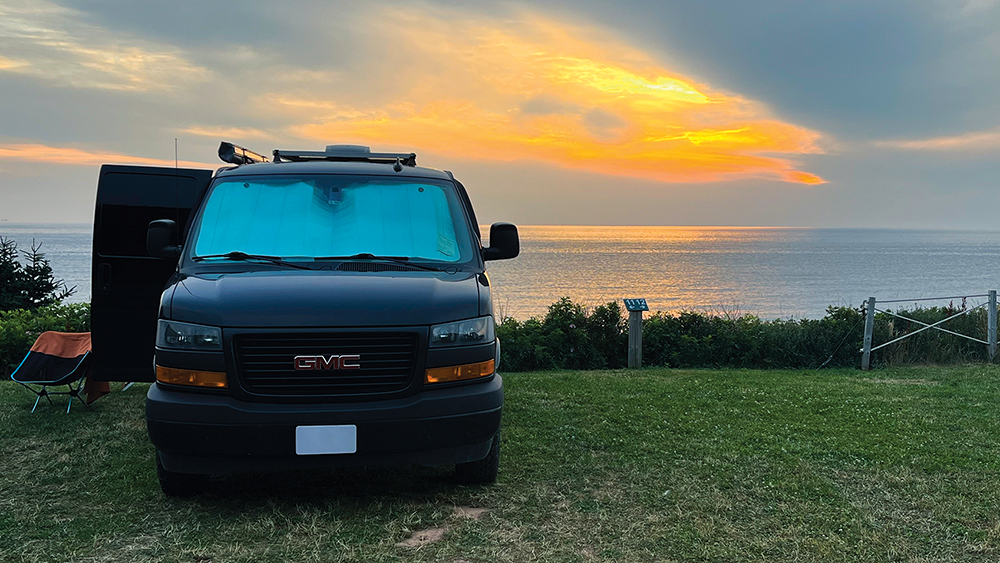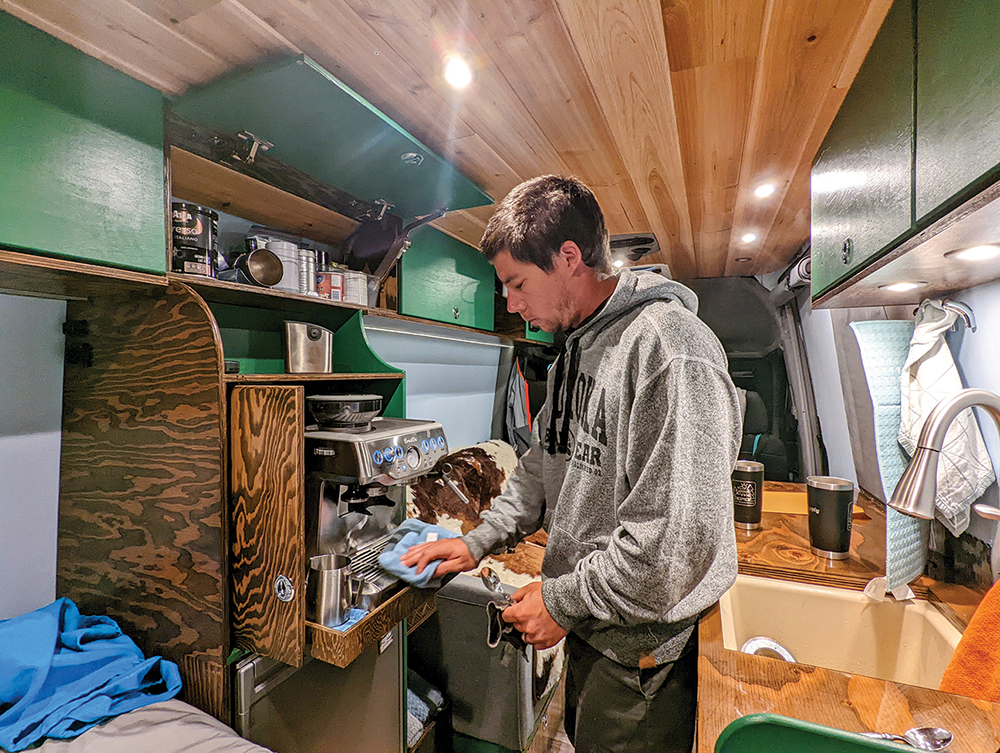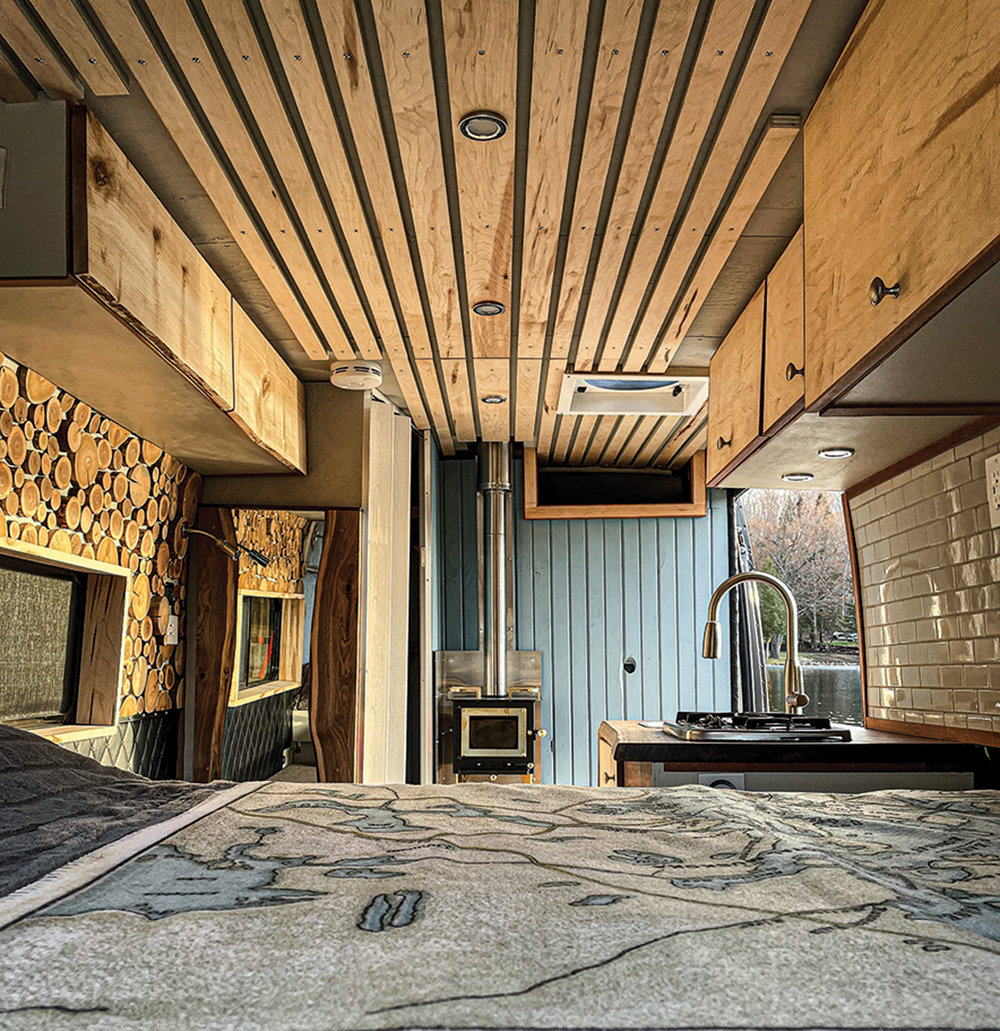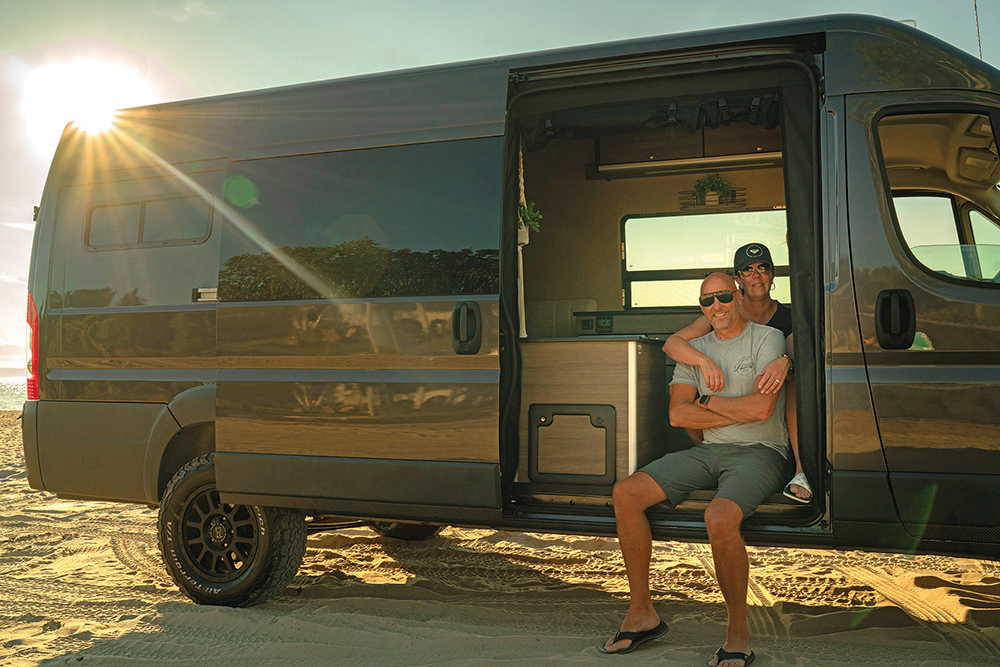The trendiest tiny homes are the ones on wheels, with the same creature comforts but a whole new mindset.
photography by Anya Shor
Among the new-vogue means of travel popularized during the COVID-19 pandemic, live-in vans have become all the rage for people pursuing adventure and leisure, whether on-grid or off-grid, weekend jaunts or boondocking on long road trips (“boondocking” is the RV term for parking in a free camping spot with no amenities).
Vans, like the popular Mercedes Benz Sprinter, the Ford Transit and the Ram ProMaster—or occasionally smaller models like the Nissan NV200—are often equipped with all-wheel drive. They offer all the creature comforts of home—minus the space—with beds, kitchen galleys, climate control, and something of a sitting room with swiveling captain’s chairs. Yet they are more versatile than big RVs or trailers-in-tow, permitting easier navigation of rugged roads or shopping mall lots.
“You can get the van into very small spaces. You don’t need a pull-through campsite. You don’t need an electrical hookup. There’s the ability for four-season, off-grid adventure because you can be on the road three to four days without charging the battery. Also, it’s a lot easier to drive around,” says van-owner Mark Hachmer.
All the creature comforts of home.
Hachmer and his wife Linda, retired after spending most of their lives in Gravenhurst in education, spent 35 consecutive nights in their converted GMC Savana on a trip to the west coast of Newfoundland this past summer, what Hachmer describes as a “totally awesome experience.” They spent nary a single night in a hotel. Their customized van, about half the size of an average bedroom at about 60 square feet, contains a 12-volt refrigerator, Webasto heater, a recharging 200 amp hour lithium-ion battery system, rooftop solar panels, a mini kitchen, storage and a bed for two.
The outdoor-loving couple say their van is just comfortable enough, without being too comfortable to keep them from venturing outside in inclement weather.
The Hachmers had their van custom-outfitted locally by Ray Outfitted, a Simcoe County business owned by Madison McNair and her husband Raynor Vickers, an automotive and marine mechanic, who crisscrossed Canada and the United States for two years in their own converted van before starting their business. Their shop, spacious enough for four vans, sits adjacent to their cottage country home 45 minutes’ drive from Collingwood.
Although van travel’s newfound popularity is good for business, they avoid the overly hashtagged label “vanlife.”
“The term vanlife tends to be more full-time living, so ‘over-landing’ and ‘RVing’ are terms that tend to apply more to our client base,” says McNair. She says customers are typically retirees looking to spend more time on the road, or busy professionals who want to make the most of their limited leisure time.
“Either way, you can end up with a similar vehicle, one that’s not dependent on reservations for campsites with full hookups. You want a system that’s self-contained and self-sufficient,” McNair says. The distinguishing feature is the off-grid electrical system, complete with rooftop panels and banks of batteries, typically stored under the bed.
Ray Outfitted serves clients with diverse wishlists for their homes-on-wheels, limited only by their imaginations—and budget. Costs range from about $80,000 to $130,000, in addition to the base vehicle price. And, as with any renovation, any changes add to the cost.
One client, a general practitioner in Quebec, utilizes her van as a rolling medical office, complete with an ultrasound machine and other diagnostic equipment during the week. In a day, it magically transforms into RV mode for off-time adventures, with built-in racks for mountain bikes and the bed reinstalled.
A pair of retirees, Jule Alleyn, a massage therapist, and Lance Collins, formerly a sporting goods store owner, tested their appetite for van trips in a relatively diminutive Toyota Rav4 before working with Ray Outfitted on a Ford Transit. They’re planning a long ski trip to the powder highway in Interior B.C. this winter.
“We wanted a vehicle with all-wheel drive to navigate the snowy ski hill roads and rougher gravel backroads,” said Collins, of Sudbury, by email. Features will include enough insulation for comfortable nights at minus 25 C, and double roof fans to prevent condensation.
The dream is to ski the slopes of Whitewater, Red Mountain or Silver Star all day, then return to the comfort of a private chalet that they can relocate at will.
“The van is our home, certainly as comfortable as a hotel room with our bed, gas heater, small kitchen and our front seats turned around to make a lounge area. We can hang out at the hill, drive into town or even head to the hot springs,” says Collins.
These days, Ray Outfitted is working on a large ProMaster for a cardiologist and his wife. The van includes solar panels, four 160 amp hour lithium batteries, an air conditioner, roof fans, built-in cabinetry and fridge, toaster oven, induction cooktop, awning, step rails, a hydronic heating system with radiant heated floors, hot running water, television, queen bed, interior designer-conceived woodworking, an indoor/outdoor shower, and a composting toilet. As with most of the vehicles Ray Outfitted equips, the ProMaster will be insulated for four-season travel.
With unlimited options to choose from, it pays to approach a van conversion like a home purchase, with a budget and a list of must-haves.
Raynor also strongly advises dipping your toes into van travel with rentals (GoRVing.ca has information and a rental directory) before investing in your own vehicle.
The Hachmers of Gravenhurst, who relocated to Perth, Ontario, last year, started with a list they called their “manifesto.”
“Make a list of everything you seem to think you need, then be brutally honest,” Mark Hachmer says. “Instagram and YouTube show highlights of van life but what is possible isn’t necessarily what’s practical.”
“Ultimately if you’re on the road, you’re looking for something, you’re looking for change, there’s a bit of escapism from what your life was before,” Ray Outfitted’s McNair says. “That freedom of the open road—it doesn’t matter if you have a $300,000 vehicle or a $20,000 vehicle, you get to go to the same places.”
An alternative to a custom-built van from scratch is a pre-packaged option. Several Canadian factory operations, including Leisure Travel Vans in Winkler, Manitoba and Pleasure-Way Industries in Saskatoon, offer templated versions on their websites, with options.
Sara and Scott Tuck of Orillia ordered their extended 2018 Ram ProMaster from Wilderness Vans in Lethbridge, Alberta, with a queen bed, benches, grey and fresh water tanks, cooktop/sink combo, diesel heater, shower, solar unit, potlights, ventilation windows, roof fan, Bugwall insect screens and a full “garage”—the term for the storage space in the back of the van, under the bed, which the Tucks use to stow outdoor gear.
The Tucks took delivery of their van in December 2020, in the midst of the pandemic, and “are loving every minute of it,” says Sara Tuck, manager of continuing education and corporate training at Georgian College. A favourite memory to date is “travelling around Lake Superior, meeting other families.
“Home is where you park it. We live minimally in the van, we meet amazing people from around the world, we are connected to a new community of friends (through social media), we learn to appreciate having less. There are few negatives—it’s just a different mindset.” —Staff


















